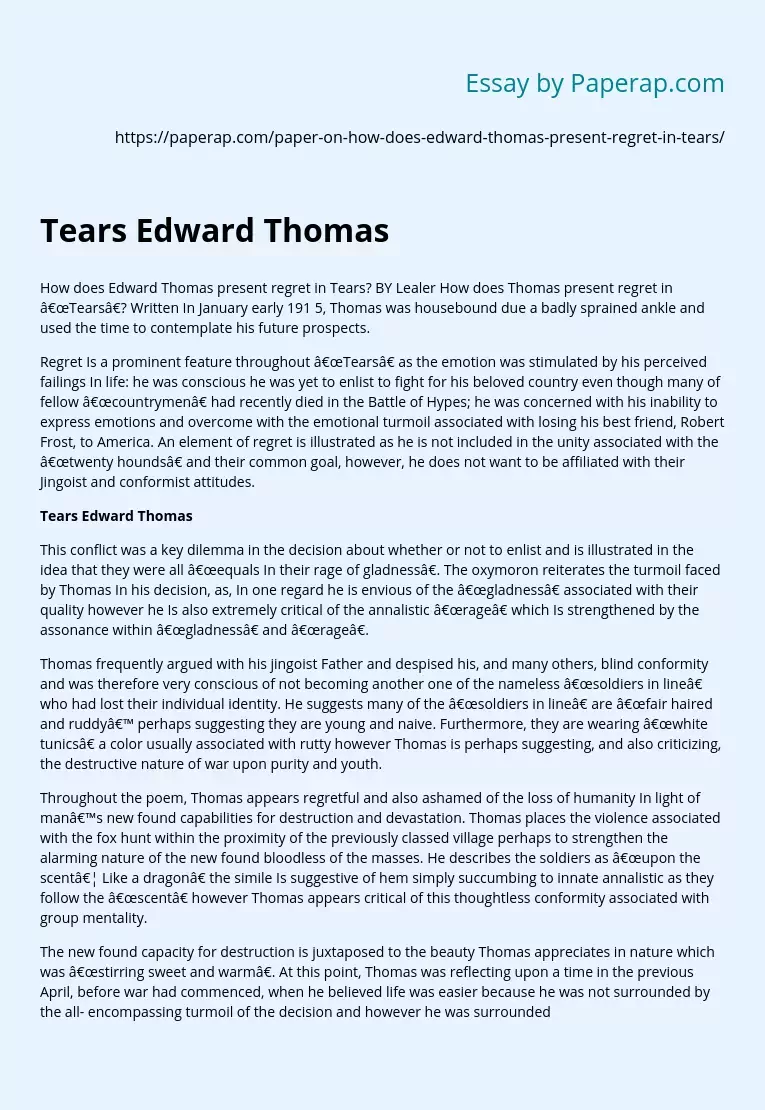Expression of Regret in Tears Edward Thomas
How does Edward Thomas present regret in Tears? BY Lealer How does Thomas present regret in “Tears”? Written In January early 191 5, Thomas was housebound due a badly sprained ankle and used the time to contemplate his future prospects.
Regret Is a prominent feature throughout “Tears” as the emotion was stimulated by his perceived failings In life: he was conscious he was yet to enlist to fight for his beloved country even though many of fellow “countrymen” had recently died in the Battle of Hypes; he was concerned with his inability to express emotions and overcome with the emotional turmoil associated with losing his best friend, Robert Frost, to America.
An element of regret is illustrated as he is not included in the unity associated with the “twenty hounds” and their common goal, however, he does not want to be affiliated with their Jingoist and conformist attitudes.
Tears Edward Thomas
This conflict was a key dilemma in the decision about whether or not to enlist and is illustrated in the idea that they were all “equals In their rage of gladness”.
The oxymoron reiterates the turmoil faced by Thomas In his decision, as, In one regard he is envious of the “gladness” associated with their quality however he Is also extremely critical of the annalistic “rage” which Is strengthened by the assonance within “gladness” and “rage”.
Thomas frequently argued with his jingoist Father and despised his, and many others, blind conformity and was therefore very conscious of not becoming another one of the nameless “soldiers in line” who had lost their individual identity.
He suggests many of the “soldiers in line” are “fair haired and ruddy’ perhaps suggesting they are young and naive. Furthermore, they are wearing “white tunics” a color usually associated with rutty however Thomas is perhaps suggesting, and also criticizing, the destructive nature of war upon purity and youth.
Throughout the poem, Thomas appears regretful and also ashamed of the loss of humanity In light of man’s new found capabilities for destruction and devastation. Thomas places the violence associated with the fox hunt within the proximity of the previously classed village perhaps to strengthen the alarming nature of the new found bloodless of the masses. He describes the soldiers as “upon the scent… Like a dragon” the simile Is suggestive of hem simply succumbing to innate annalistic as they follow the “scent” however Thomas appears critical of this thoughtless conformity associated with group mentality.
The new found capacity for destruction is juxtaposed to the beauty Thomas appreciates in nature which was “stirring sweet and warm”. At this point, Thomas was reflecting upon a time in the previous April, before war had commenced, when he believed life was easier because he was not surrounded by the all- encompassing turmoil of the decision and however he was surrounded by the support of his best friend, Robert Frost.
This Idea of a simpler and gentler life before the war Is reflected In the sibilance of “stirring” and “sweet” as it gives the words a gentle tone. It Is also seen within “As the Teams Head Brass” where, although “the blizzard felled the elm”, the destruction of nature was In equilibrium with Rexroth therefore allowing it to be the consistent force Thomas so often needed it to be, delicate balance. Thomas’ feelings of regret and inadequacy are seen with “Tears” as he is overly critical of his inability to successfully express/feel emotions.
Thomas appreciates that “tears should have fallen”, perhaps when Frost and Mervin left for USA, and therefore perhaps implying that although it did stir some emotion within him, he was cautious to openly express his true emotion as that may reveal the extent to which Thomas had previously relied upon Frost’s friendship. Thomas’ failings are also seen in “No One So Much As You” where although he states “not a word I bare spoken against you” he still believes that he merely “responds to [her]” yet does “not love”.
Although, to an extent, Thomas appears regretful at his inability o express emotions he is also perhaps suggesting that too great an importance is placed upon love as Thomas, frequently plagued with bouts of neurasthenia, could not rely on his emotions to remain consistent and would therefore rather accept, as implied “The Glory’, he may have to be “content with discontent”. Although Thomas appears regretful about certain aspects of his life throughout “Tears” he is arguably never fully content with any part of his life due to the extent of his neurasthenia and his indecisive tendencies.
Expression of Regret in Tears Edward Thomas. (2019, Dec 05). Retrieved from https://paperap.com/paper-on-how-does-edward-thomas-present-regret-in-tears/

